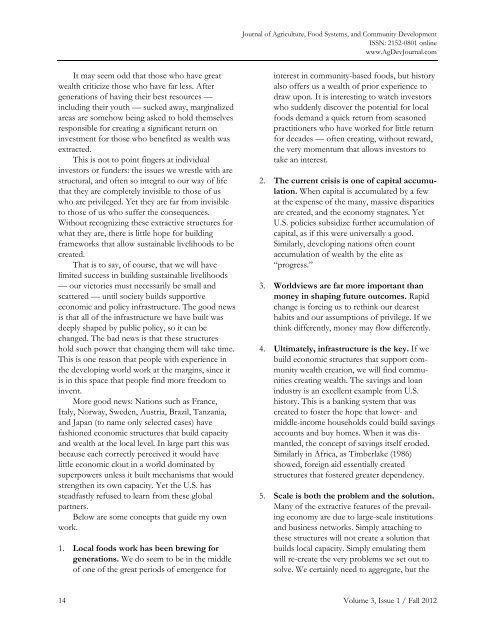Journal of Agriculture, Food Systems, and Community Development
Journal of Agriculture, Food Systems, and Community Development
Journal of Agriculture, Food Systems, and Community Development
Create successful ePaper yourself
Turn your PDF publications into a flip-book with our unique Google optimized e-Paper software.
<strong>Journal</strong> <strong>of</strong> <strong>Agriculture</strong>, <strong>Food</strong> <strong>Systems</strong>, <strong>and</strong> <strong>Community</strong> <strong>Development</strong><br />
ISSN: 2152-0801 online<br />
www.AgDev<strong>Journal</strong>.com<br />
It may seem odd that those who have great<br />
wealth criticize those who have far less. After<br />
generations <strong>of</strong> having their best resources —<br />
including their youth — sucked away, marginalized<br />
areas are somehow being asked to hold themselves<br />
responsible for creating a significant return on<br />
investment for those who benefited as wealth was<br />
extracted.<br />
This is not to point fingers at individual<br />
investors or funders: the issues we wrestle with are<br />
structural, <strong>and</strong> <strong>of</strong>ten so integral to our way <strong>of</strong> life<br />
that they are completely invisible to those <strong>of</strong> us<br />
who are privileged. Yet they are far from invisible<br />
to those <strong>of</strong> us who suffer the consequences.<br />
Without recognizing these extractive structures for<br />
what they are, there is little hope for building<br />
frameworks that allow sustainable livelihoods to be<br />
created.<br />
That is to say, <strong>of</strong> course, that we will have<br />
limited success in building sustainable livelihoods<br />
— our victories must necessarily be small <strong>and</strong><br />
scattered — until society builds supportive<br />
economic <strong>and</strong> policy infrastructure. The good news<br />
is that all <strong>of</strong> the infrastructure we have built was<br />
deeply shaped by public policy, so it can be<br />
changed. The bad news is that these structures<br />
hold such power that changing them will take time.<br />
This is one reason that people with experience in<br />
the developing world work at the margins, since it<br />
is in this space that people find more freedom to<br />
invent.<br />
More good news: Nations such as France,<br />
Italy, Norway, Sweden, Austria, Brazil, Tanzania,<br />
<strong>and</strong> Japan (to name only selected cases) have<br />
fashioned economic structures that build capacity<br />
<strong>and</strong> wealth at the local level. In large part this was<br />
because each correctly perceived it would have<br />
little economic clout in a world dominated by<br />
superpowers unless it built mechanisms that would<br />
strengthen its own capacity. Yet the U.S. has<br />
steadfastly refused to learn from these global<br />
partners.<br />
Below are some concepts that guide my own<br />
work.<br />
1. Local foods work has been brewing for<br />
generations. We do seem to be in the middle<br />
<strong>of</strong> one <strong>of</strong> the great periods <strong>of</strong> emergence for<br />
interest in community-based foods, but history<br />
also <strong>of</strong>fers us a wealth <strong>of</strong> prior experience to<br />
draw upon. It is interesting to watch investors<br />
who suddenly discover the potential for local<br />
foods dem<strong>and</strong> a quick return from seasoned<br />
practitioners who have worked for little return<br />
for decades — <strong>of</strong>ten creating, without reward,<br />
the very momentum that allows investors to<br />
take an interest.<br />
2. The current crisis is one <strong>of</strong> capital accumulation.<br />
When capital is accumulated by a few<br />
at the expense <strong>of</strong> the many, massive disparities<br />
are created, <strong>and</strong> the economy stagnates. Yet<br />
U.S. policies subsidize further accumulation <strong>of</strong><br />
capital, as if this were universally a good.<br />
Similarly, developing nations <strong>of</strong>ten count<br />
accumulation <strong>of</strong> wealth by the elite as<br />
“progress.”<br />
3. Worldviews are far more important than<br />
money in shaping future outcomes. Rapid<br />
change is forcing us to rethink our dearest<br />
habits <strong>and</strong> our assumptions <strong>of</strong> privilege. If we<br />
think differently, money may flow differently.<br />
4. Ultimately, infrastructure is the key. If we<br />
build economic structures that support community<br />
wealth creation, we will find communities<br />
creating wealth. The savings <strong>and</strong> loan<br />
industry is an excellent example from U.S.<br />
history. This is a banking system that was<br />
created to foster the hope that lower- <strong>and</strong><br />
middle-income households could build savings<br />
accounts <strong>and</strong> buy homes. When it was dismantled,<br />
the concept <strong>of</strong> savings itself eroded.<br />
Similarly in Africa, as Timberlake (1986)<br />
showed, foreign aid essentially created<br />
structures that fostered greater dependency.<br />
5. Scale is both the problem <strong>and</strong> the solution.<br />
Many <strong>of</strong> the extractive features <strong>of</strong> the prevailing<br />
economy are due to large-scale institutions<br />
<strong>and</strong> business networks. Simply attaching to<br />
these structures will not create a solution that<br />
builds local capacity. Simply emulating them<br />
will re-create the very problems we set out to<br />
solve. We certainly need to aggregate, but the<br />
14 Volume 3, Issue 1 / Fall 2012






